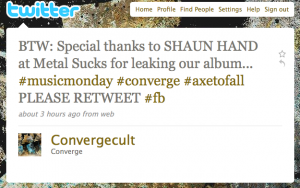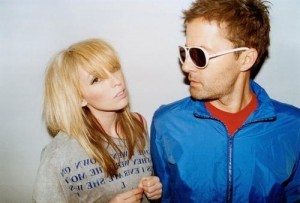Today one of the music stories doing the rounds is the leak of The Ting Tings album, which has apparently made its way onto file sharing networks. This is the latest in a long line of leaks. I would suspect, despite attempts to stall through copy protection, most records are now leaked prior to release. This is the reality. As Records On Ribs is in part an experiment with “being a record label” this made me consider some things.
At ROR we still believe in release dates, even if just for the moment. Some of our artists are happy for us to just put their music out, but others, we feel we need some lead in. Simply, a release date gives you a calendar and a moment in your mind to work promotion towards, get things ready and produce any physical copies in a timely fashion. So the release for our next record, Talk Less, Say More‘s England Without Rain is the 26th of February. Unless you are Radiohead and can just throw up a blog post and let the internet do the rest, if you want the release to reach as many ears as possible, which is always our intention, you need to do promotion, so a release date sets out the mental map.
At the moment when we send music out in advance (for download only, CDs are wasteful in advance we feel), the following message can be found attached:
Although we [Records On Ribs] allow file-sharing as all our releases are distributed under a Creative Commons License, we ask that you use your use common sense when distributing material that is unreleased.
Today’s leak got me thinking about this. These thoughts are naturally sketchy, incomplete and likely have their serious flaws and incoherence. But they effected a change in policy here.

Why do people leak records? I’d imagine there are a few motivations, motivations which I think are likely slightly different from sharing in general. The first, which I’d imagine is the most common: genuine fandom and love of the music to the point you want others to hear it. This seems to be the case for the Ting Tings release, where the band were only informed by checking their @ replies on Twitter. The second reason is to do with the file-sharing community in general. Simply put, early leaking records carries a great deal of respect in these circles.
I’ll leave the second reason aside of this to one side for the moment, as it would take me far outside the remit of this blog post and deal with the former reason. Sharing music in advance is somewhat of an effort. At the least, it probably requires ripping the CD, uploading it, tagging and so on. Putting my artist hat on for the moment, if people felt sufficiently enthused by my music to go through this, I would be flattered, not offended. Another interesting fact: the people who do the most leaking are journalists, likely. Their motivations would be interesting to consider on this.
Yet this is perhaps naive. There are obvious reasons why people take the opposite stance. The most obvious reason is commercial, some of the issues we have discussed before on this blog. A leak is not massively different from any para-legal file sharing in this regard, though likely more irksome as it undermines promotional efforts and makes the record less “fresh” when it does reach the release date. I think some of this is fixation in the mind of the artist on “my record will be out then”, its a little like people opening their records before Christmas, the trashing of effort for a certain day and surprise. The other issue is the leaking of unfinished material that does not represent the final vision of the artist involved. This to my mind seems significantly more annoying, though also reflects a hunger for your music that, looked at awry, could also be flattering.
However, in terms of promotion of the record, a well placed leak might do it no harm at all. Not only does it have the (undeniably complex) promotional effects of file sharing in general, but it also creates a buzz around an artist. The Ting Tings album, for one, took a gigantic leap to the front page of The Guardian website. Before this, I wasn’t even aware of the record, or that this artist were still making music. Now at least I am aware of its existence and will likely listen to the singles in passing. Whatever the subjective stance of the artists in this case (they were annoyed) the objective result is a bump.
Doubtless, if someone went to the trouble of leaking one of our records, it would improve its spread and we’d be pleased. Since we are Creative Commons in any case, has no material effect. Therefore, in future then Records On Ribs releases will have the following message:
Records On Ribs operate a pro-leak policy. If you are listening to this record prior to release, if you like and want to share it, please do so by leaking it under the terms of our standard Creative Commons License. Thanks a lot, we appreciate it.
If you leak our records, we’d be pleased. So if you get a chance to leak England Without Rain (out on the 26th of February), knock yourself out. Extra points go to ripping the stream from SoundCloud and uploading it to YouTube.
Of course, you else can listen to the album below before MP3/FLAC/Ogg downloads and physical copies are available on the 26th.












